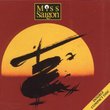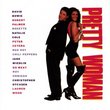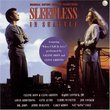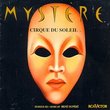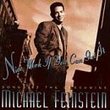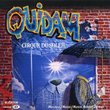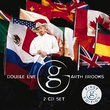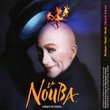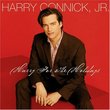| All Artists: Hans Zimmer Title: The Da Vinci Code Members Wishing: 0 Total Copies: 0 Label: Decca Original Release Date: 5/19/2006 Re-Release Date: 5/9/2006 Album Type: Soundtrack Genres: Pop, Soundtracks Style: Number of Discs: 1 SwapaCD Credits: 1 UPC: 602498540411 |
Search - Hans Zimmer :: The Da Vinci Code
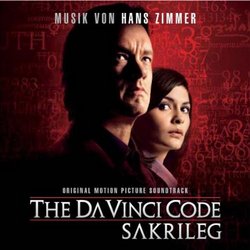 | Hans Zimmer The Da Vinci Code Genres: Pop, Soundtracks
For his adaptation of Dan Brown's megaselling book, director Ron Howard didn't take any risks, he called one of Hollywood's most popular composers, Hans Zimmer. Zimmer is a skilled craftsman, which is good and bad since he... more » |
Larger Image |
CD DetailsSynopsis
Amazon.com For his adaptation of Dan Brown's megaselling book, director Ron Howard didn't take any risks, he called one of Hollywood's most popular composers, Hans Zimmer. Zimmer is a skilled craftsman, which is good and bad since he adequately delivers in a variety of styles, but usually misses the extra unexpected zing that makes a score truly memorable. His work for The Da Vinci Code is almost entirely muted. This may well be one of the quietest soundtracks to a blockbuster you've ever heard; only bursts of threatening-sounding strings occasionally break the quasi-ambient mood. The strategy is particularly efficient on "L'Esprit des Gabriel," which swells in a pleasantly ominous way. It's the kind of track that benefits greatly from blasting through a movie theater's multiple speakers. As a whole the score is as serious-minded as the movie's plot is preposterous. The most compelling aspect is Zimmer's use of a choir, especially on "Malleus Maleficarum," "Salvete Virgines" (paired with clanging metallic percussion), and "Poisoned Chalice," in which soprano Hila Plitmann takes eerie center stage. Yet overall it's often difficult to tell the cues aside, awash as they are in a sea of somber strings. Once upon a time, Hollywood took artistic risks on some of its bigger offerings. Is that time gone for good? --Elisabeth Vincentelli Similarly Requested CDs
|
CD ReviewsAncient tapestry of opulent sounds - Kasia S. | New York City | 05/19/2006 (5 out of 5 stars) "It took me about 2 seconds of thought whether I should buy this CD as I laid my eyes on it. All I can say is that the money I brought with me to get dinner was spent in a better way on music that literally fed the soul better than any food. I'm a huge soundtrack lover and collector and movie scores are my favorite, especially grand movies that stay in my memory such as costume dramas and period pieces. Within 1 minute of having this music on half the hair on my body was standing pin straight. The choruses are out of this world, giving this a mythical, sacred sound that made me feel as if I was falling into the music itself. Hans Zimmer is a master of creating an environment with his music that envelops the listener and makes the movies on 100% more real than it can be. The Da Vinci Code soundtrack sounds just the way you would imagine it to; rich, opulent, hypnotic mix of choruses that pick you up from ancient catacombs and shoot you straight up to heaven. Although I loved the score on the first listen, upon hearing it again a few times I felt like it sounded even better as I knew what to expect and learned to relish the glorious sounds and even though I don't read Latin the chapter titles from the back made more sense to me. This soundtrack was a mix of powerful orchestra music, some lovely violin solos, great chase music and wonderful choral tapestry of sounds. This music is not all heavy and ancient; there are some lovely romantic moments with opreatic arias ("poisoned chalice"), harphs, crying cellos and violas that transported me to a magical valley, with hurling winds and open spaces. Overall it's a lovely soundtrack and a must have for anyone who enjoys original scores and can be listened to no matter what mood or time of the day because it's beauty stands true regardless of everything else." Hans Zimmer Provides Subtle Ambience & Increasing Tension In Kaya Savas | North Hollywood, CA | 05/17/2006 (5 out of 5 stars) "As a Hans Zimmer fan, I eagerly count the days till the release of a Zimmer score, or any Media Ventures score for that matter. Zimmer's work on The Da Vinci Code reunites him for the second time with director Ron Howard. It strikes me odd that Ron Howard didn't develop a continuing collaboration with Zimmer after Backdraft considering the success of that film. Hans Zimmer is known for establishing great working relationships with directors such as Ridley Scott, John Woo, Antoine Fuqua, Gore Verbinski, and Penny Marshall. The score is unique and borrows elements from his previous scores to Hannibal, The Ring, and Batman Begins. It's not the bombastic action score we've come to expect from Zimmer, then again this is not a bombastic action movie. Zimmer creates tension with most of the tracks, and he adds a Latin choir to some tracks to set the religious tone of the film. In fact, the British Film censors said that the filmmakers had to tone down Zimmer's score in the film if they wanted to get a 12A rating versus a 15. I've never heard of a film's score affecting the rating of a film. Track 7, "Salvete Virgines", is a perfect example of the choir even though it is not used in the film. Another highlight of the album is track 10, "The Citrine Cross", where we get a little glimpse of trademark Zimmer in probably the most "action" oriented track. The second to last track, "Chevaliers De Sangreal", is my favorite cue on the album. Any Zimmer fan could pick that track out of a lineup and say 'that's Hans Zimmer'. It reminded me of "Journey To The Line" from his score to The Thin Red Line, not in tone but in structure. It builds slowly and continues to build into a full blown beautiful mixture of orchestration and digital synthesization. When I first listened to that track it sent chills down my spine, it did the same thing to me in the film. Hans Zimmer is my favorite composer of all time, he is truly a gifted artist who continues to be the leader in modern film music composition. Zimmer's first score for 2006 is a beautiful subtle piece of music, and it will please Zimmer fans till we get his score release for Pirates Of The Caribbean: Dead Man's Chest in July." Quite exquisite John Vevers | Sydney, Australia | 06/19/2006 (5 out of 5 stars) "I must admit, I am not a major Hans Zimmer fan but do have a small selection of his scores on cd. However, I can honestly say that Zimmer's score for The Da Vinci Code is, without doubt, one of the best soundtracks avaliable at the moment; if not amongst the best ever written.
His score is simple, quiet and yet, at the same time, stirringly beautiful. I have read reviews on other websites stating that Zimmer has made no effort to create major themes for the different characters; I disagree. Having listened to it many times since I bought it, I believe there are several cues, motiffs etc that represent not only the characters of Sophi, Silas, but also different emotions etc. The stand out track on this album, in my opinion, is Chevaliers de Sangraal - it is absolutely breathtaking. A simply brilliant piece of music; even before seeing the film, I could picture this music being played as the final resting place of the Holy Grail is located; the timing is correct, the sound is right - it's just perfect for such an event. If you get one classical, or soundtrack album this year; make it this one." |

 Track Listings (14) - Disc #1
Track Listings (14) - Disc #1